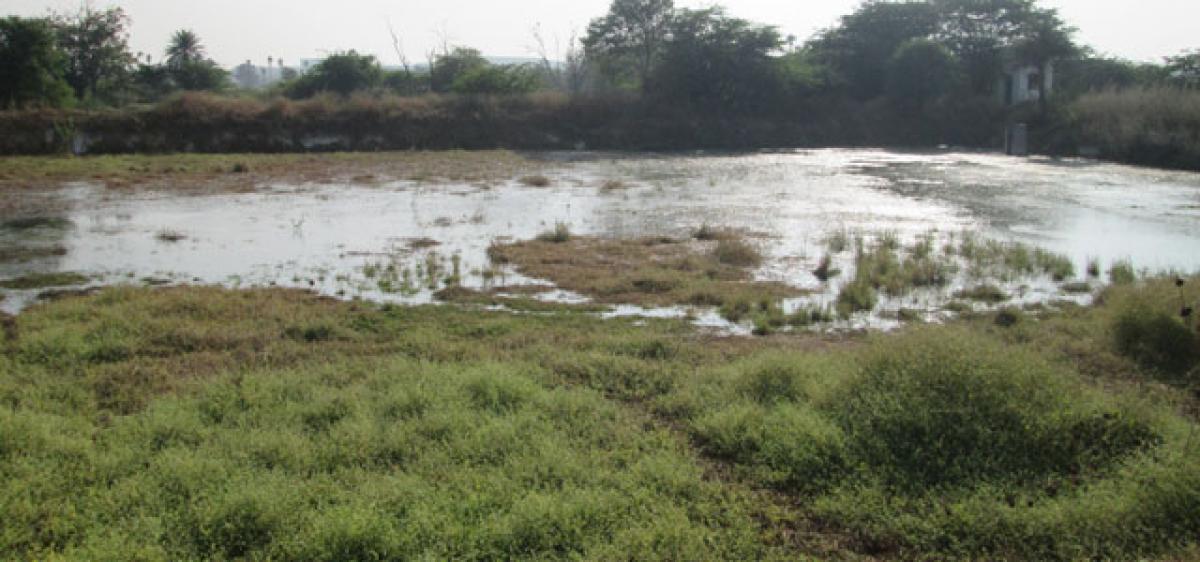Live
- Punjab hikes maximum state-agreed price for sugarcane, highest in country
- Centre okays PAN 2.0 project worth Rs 1,435 crore to transform taxpayer registration
- Punjab minister opens development projects of Rs 120 crore in Ludhiana
- Cabinet approves Atal Innovation Mission 2.0 with Rs 2,750 crore outlay
- Centre okays Rs 3,689cr investment for 2 hydro electric projects in Arunachal
- IPL 2025 Auction: 13-year-old Vaibhav Suryavanshi becomes youngest player to be signed in tournament's history
- About 62 lakh foreign tourists arrived in India in 8 months this year: Govt
- IPL 2025 Auction: Gujarat bag Sherfane Rutherford for Rs 2.60 cr; Kolkata grab Manish Pandey for Rs 75 lakh
- Assam CM meets Governor, cabinet expansion on the cards
- IPL 2025 Auction: RCB buy Jacob Bethell for Rs 2.6 cr; Ellis sold to CSK for Rs 2 crore
Just In

For the people of Edthanur thanda located close to the Edthanur Caves, granite quarrying is the least of worries. Dumping of animal carcasses and slaughterhouse wastes by Al-Kabeer Exports Pvt Ltd very close to the hamlet has made lives of the residents a hell.
Sangareddy: For the people of Edthanur thanda located close to the Edthanur Caves, granite quarrying is the least of worries. Dumping of animal carcasses and slaughterhouse wastes by Al-Kabeer Exports Pvt Ltd very close to the hamlet has made lives of the residents a hell.
The Hans India had published a story on how the caves of Edthanur which used to be inhabited by the early man, were now being threatened with unabated granite quarrying, posing grave threat to the place of archaeological significance.
But the residents (all belonging to ST-Lambada community) have been suffering from a more serious health hazard for the past six years, ever since Al-Kabeer has setup its slaughterhouses in the village around 1991.
While the plant located on Rudraram village limits looks well-maintained, there are hundreds of acres of open lands behind the slaughterhouses on the Edthanur side, which have become dumping grounds for unused animal wastes.
A visit to the hamlet exposes a medical and healthcare disaster unfolding right in front of our eyes. Deep pits were dug at various locations on the company’s premises away from outsiders’ view and animal wastes are being dumped and left there to decompose, mixing with water collected in the pits, turning the pits into a quicksand of poison.
Hundreds of bovines and sheep have accidentally fallen into the pits and died, according to the villagers. Many have died after drinking water from these pits, they say. A nauseating smell of decomposition emanates from these dump yards of Al-kabeer, which have been carrying airborne diseases as far as Edthanur village. There is a sump built within the facility, where waste water coming out of the slaughterhouse is collected.
During the rainy season, this water flowed into Turka Cheruvu, an irrigation tank located in Edthanur village. The villagers complain that even the water collected from the bore-wells in the village is neither safe for drinking, nor for other domestic use. The water reeks of meat and also contains white powdered substance which comes out of granite quarrying.
The villagers have raised the issue several times with their sarpanch and authorities, but every time the villagers would be convinced that the dumping would not happen again. Nothing changes though. “They threatened us that they would use police against us. They warned us that cases would be booked against us. The leaders get their share and then nothing happens,” says Heeriya Naik, a senior citizen of Edthanur thanda, who has lost all hopes on the system.
Women in the hamlet look unhealthy and say both the animal waste dumping and granite quarrying have made their hamlet uninhabitable. Due to close proximity of the dump yard with agricultural fields, contaminated water from the bore-well has affected crops adversely. Farmers cannot find labourers willing to work in the area due to the terrible smell. Stray dogs which feast on decomposing flesh have been acting like mad dogs by attacking the villagers and their farm animals, raising grave concerns about spread of diseases like Rabies.
“It is like we have been outcast from the society. Out relatives don’t come to visit us. Nobody wants to give their daughter to men in our hamlet for marriage,” said Tulsabai, a resident of Edthanur Thanda. “Mothers are not able to give birth to healthy babies. Infant mortality rate and maternity mortality rate in out hamlet is also high,” said a youngster from the hamlet, who is a graduate.
After news reports started getting published this week on the gross environmental violations happening in the area, many of the pits have been covered by the company. However, animal bones can be clearly seen and the unbearable smell is something which hasn’t gone away. Nobody can return without a bad headache after paying a visit to that place. Just imagine how the villagers have been living there through years.
“We are not opposed to the company’s work. All we expect from them is to respect our right to live and to ensure air and water pollution doesn’t happen there,” pleaded Hanumanthu, another resident of the hamlet. Edthnur hamlet is located just a few kilo metres from Sangareddy town and is not too far away from the Manjeera River.
By Vivek Bhoomi

© 2024 Hyderabad Media House Limited/The Hans India. All rights reserved. Powered by hocalwire.com







